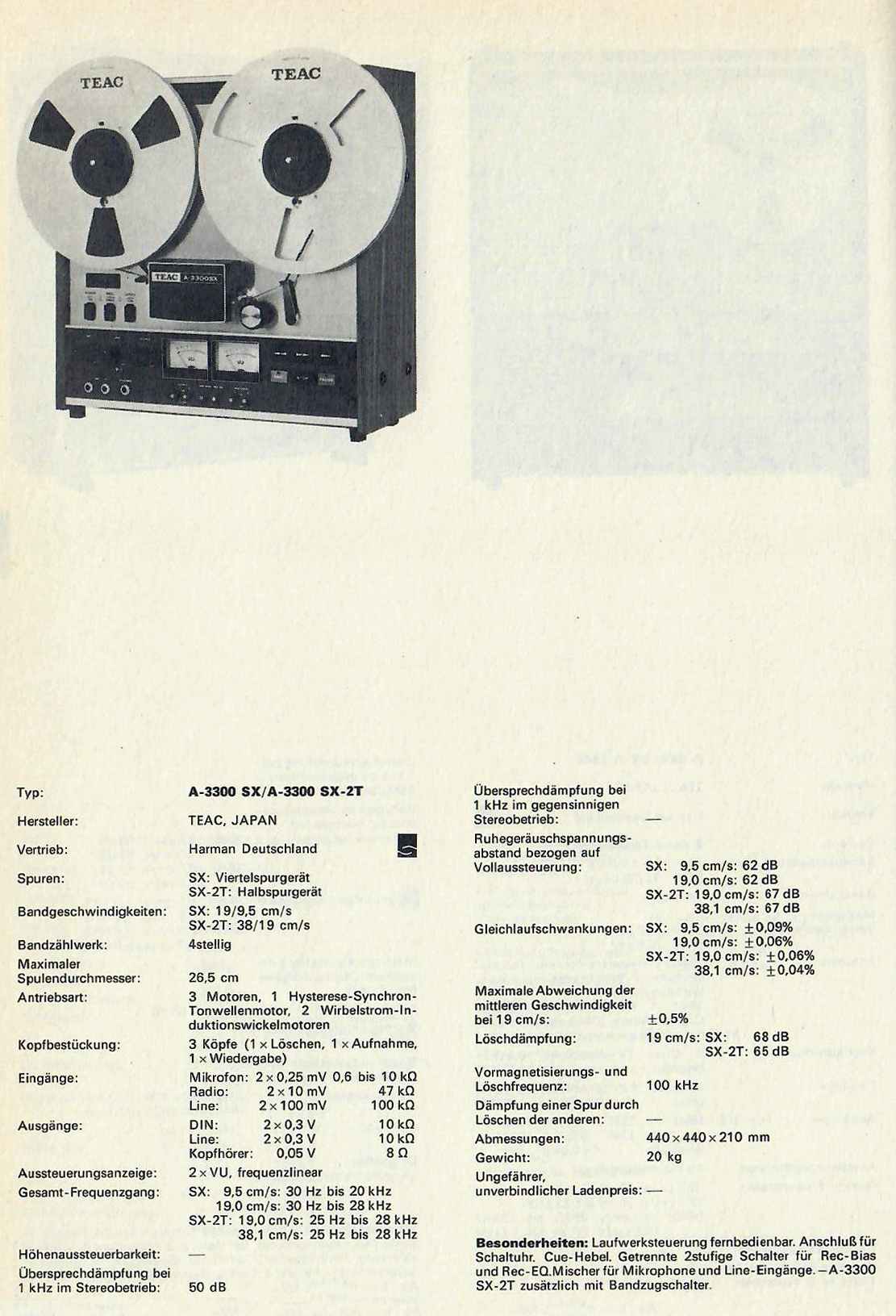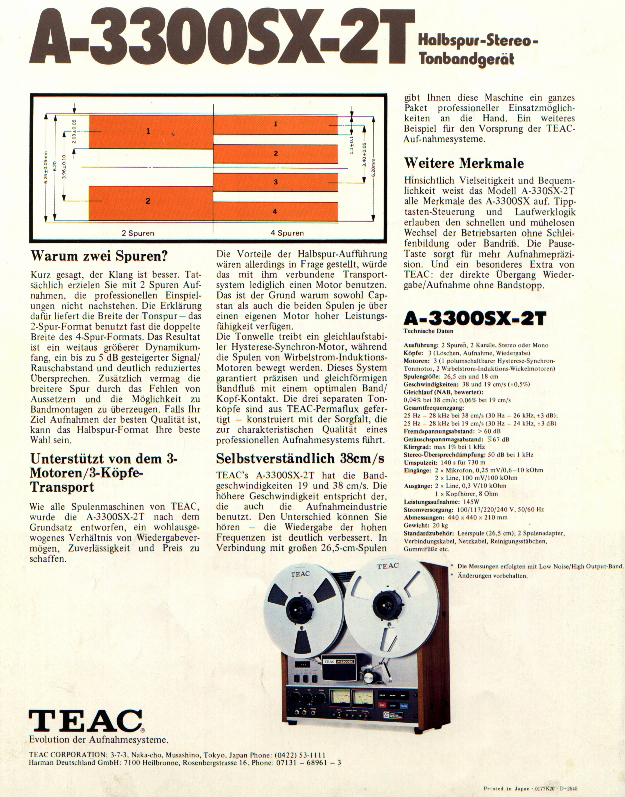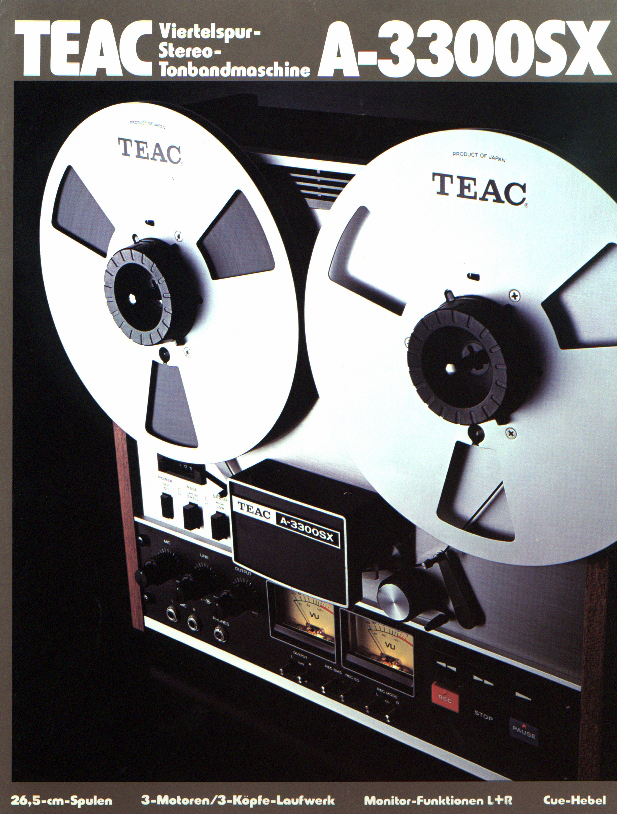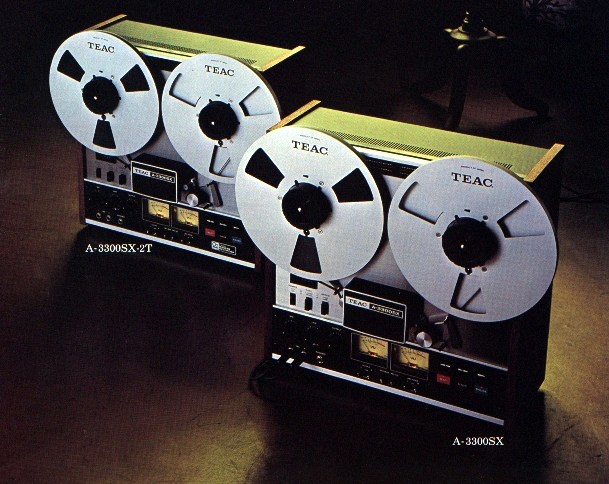Difference between revisions of "Teac A-3300SX-2T"
| (10 intermediate revisions by the same user not shown) | |||
| Line 1: | Line 1: | ||
__NOTOC__ | __NOTOC__ | ||
| − | == | + | == Data == |
| − | {{ | + | {{navigation}} |
| − | ''' | + | '''General''' |
| − | * | + | * Manufacturer: [[Teac]] |
| − | * | + | * Model: A-3300 SX-2T |
| − | * | + | * Type: Half-track tape machine |
| − | * | + | * Years of manufacture: 1976 - 1979 |
| − | * | + | * Made in: Japan |
| − | * | + | * Color: Silver / Black, housing side parts wood |
| − | + | * Original price approx.: 2'148 DM | |
| − | * | ||
| − | ''' | + | '''Technical data''' |
| − | [[ | + | [[File:Teac A-3300 SX-3300 SX 2-T-Daten.jpg]] |
| − | == | + | [[File:Teac A-3300 SX-3300 SX 2-T-Prospekt-3.jpg|650px]] |
| − | * | + | |
| − | * | + | |
| + | == Comments == | ||
| + | * Other models in the same series: | ||
| + | * Tape machines: | ||
* [[Teac A-2300 SD]] | * [[Teac A-2300 SD]] | ||
* [[Teac A-2300SX]] | * [[Teac A-2300SX]] | ||
* [[Teac A-2340SX]] | * [[Teac A-2340SX]] | ||
| − | * [[Teac A- | + | * [[Teac A-3300SX]] |
* [[Teac A-3300SX-2T]] | * [[Teac A-3300SX-2T]] | ||
* [[Teac A-3440]] | * [[Teac A-3440]] | ||
| Line 35: | Line 37: | ||
| − | * Tape Decks | + | * [[Tape Decks]] |
* [[Teac A-103]] | * [[Teac A-103]] | ||
* [[Teac A-106]] | * [[Teac A-106]] | ||
| Line 47: | Line 49: | ||
| − | == | + | == Pictures == |
| − | * | + | * Extract from brochure: Teac A-3300 SX-2T |
| − | [[ | + | [[File:Teac A-3300 SX-3300 SX 2-T-Prospekt-1.jpg|650px]] |
| + | |||
| + | |||
| + | * Excerpt from brochure: Teac A-3300 SX-2T | ||
| + | [[File:Teac A-3300 SX-3300 SX 2-T-Prospekt-2.jpg|650px]] | ||
| − | == | + | == Reviews == |
| − | * | + | * The Teac A-3300SX-2T is the highspeed version of the Teac A-3300SX, as it has playback speeds of 19cm/s and 38 cm/s (A-3300SX 9.5 cm/s and 19 cm/s), unlike the A-3300SX. |
| − | * | + | * The high-speed version was only available as a 2-track version, while the A3300SX was sold in both quarter- and half-track versions. Doubling the width of the track and increasing the speed to 38cm/s results in an improvement of the quiescent noise voltage from 58 dbm to 60 dbm. Often the A3300SX-2T is called a semi-professional machine, because it has no balanced inputs. Nevertheless, it was often used as a master machine for professional productions (e.g. Gunther Gabriel). Due to its enormous robustness, it was used especially in Japan as a playback machine in cassette duplicators. Both the A-3300SX and the Highspeed version have microphone preamps and a mixer for mixing microphone and line signals. Both machines have trimmers for setting all parameters necessary to calibrate the machine. It is possible to set the machines to four different types of tapes, and to select the recording equalization and premagnetization parameters on the front of the machine by switch. |
| − | * | + | * It is often said as a disadvantage of the machine that it is not very high output, about 514 nWeber at 38cm/s. From the factory the machine is set to 185 nWeber. This is due to the low volt number at which the preamps operate (about 22-23 volts). |
| − | * | + | * Due to the existence of professional noise reduction devices such as Dolby SR or Telcom C4e (improving up to 30 dbm of dynamic range), this 'shortcoming' is obsolete, as a lower level setting results in considerably better distortion and channel separation values at the same time. |
| − | * | + | * As a master machine the A-3300SX-2T is a lightweight (approx. 22 kg) compared to the Telefunken M10 with 60 kg for the chassis alone. Nevertheless, it is extremely robust and has the best phase stability in stereo operation. |
| − | * | + | * The equalization time constants comply with the NAB standard, i.e., 50 + 3180 micro at 19 cm/s and 38 cm/s. |
| − | * | + | * A push-button switch is provided on the front for adjustment to different torques for small and large coils. |
| − | * | + | * In addition, the machine has switches for individual selection of the 2 tracks on the left and right as recording tracks. |
| − | == | + | == Left == |
| − | [[ | + | [[Category:Tape machines]] |
Latest revision as of 03:44, 18 May 2019
Data
General
- Manufacturer: Teac
- Model: A-3300 SX-2T
- Type: Half-track tape machine
- Years of manufacture: 1976 - 1979
- Made in: Japan
- Color: Silver / Black, housing side parts wood
- Original price approx.: 2'148 DM
Technical data
Comments
- Other models in the same series:
- Tape machines:
- Teac A-2300 SD
- Teac A-2300SX
- Teac A-2340SX
- Teac A-3300SX
- Teac A-3300SX-2T
- Teac A-3440
- Teac A-4300SX
- Teac A-6100 MK II
- Teac A-6300
- Teac A-7300
- Teac A-7300-2T
- Teac A-7300 RX
- Tape Decks
- Teac A-103
- Teac A-106
- Teac A-107
- Teac A-303
- Teac A-700
- Teac A-800
- Teac C-1
- Teac C-2
- Teac C-3
Pictures
- Extract from brochure: Teac A-3300 SX-2T
- Excerpt from brochure: Teac A-3300 SX-2T
Reviews
- The Teac A-3300SX-2T is the highspeed version of the Teac A-3300SX, as it has playback speeds of 19cm/s and 38 cm/s (A-3300SX 9.5 cm/s and 19 cm/s), unlike the A-3300SX.
- The high-speed version was only available as a 2-track version, while the A3300SX was sold in both quarter- and half-track versions. Doubling the width of the track and increasing the speed to 38cm/s results in an improvement of the quiescent noise voltage from 58 dbm to 60 dbm. Often the A3300SX-2T is called a semi-professional machine, because it has no balanced inputs. Nevertheless, it was often used as a master machine for professional productions (e.g. Gunther Gabriel). Due to its enormous robustness, it was used especially in Japan as a playback machine in cassette duplicators. Both the A-3300SX and the Highspeed version have microphone preamps and a mixer for mixing microphone and line signals. Both machines have trimmers for setting all parameters necessary to calibrate the machine. It is possible to set the machines to four different types of tapes, and to select the recording equalization and premagnetization parameters on the front of the machine by switch.
- It is often said as a disadvantage of the machine that it is not very high output, about 514 nWeber at 38cm/s. From the factory the machine is set to 185 nWeber. This is due to the low volt number at which the preamps operate (about 22-23 volts).
- Due to the existence of professional noise reduction devices such as Dolby SR or Telcom C4e (improving up to 30 dbm of dynamic range), this 'shortcoming' is obsolete, as a lower level setting results in considerably better distortion and channel separation values at the same time.
- As a master machine the A-3300SX-2T is a lightweight (approx. 22 kg) compared to the Telefunken M10 with 60 kg for the chassis alone. Nevertheless, it is extremely robust and has the best phase stability in stereo operation.
- The equalization time constants comply with the NAB standard, i.e., 50 + 3180 micro at 19 cm/s and 38 cm/s.
- A push-button switch is provided on the front for adjustment to different torques for small and large coils.
- In addition, the machine has switches for individual selection of the 2 tracks on the left and right as recording tracks.



